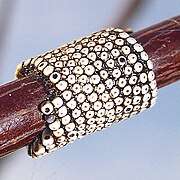Lackey moth
| Lackey | |
|---|---|

| |
| Adult with light coloration | |

| |
| Malacosoma neustria formosana | |
| Scientific classification | |
| Domain: | Eukaryota |
| Kingdom: | Animalia |
| Phylum: | Arthropoda |
| Class: | Insecta |
| Order: | Lepidoptera |
| Family: | Lasiocampidae |
| Genus: | Malacosoma |
| Species: | M. neustria |
| Binomial name | |
| Malacosoma neustria | |
| Synonyms | |
| |
The lackey moth (Malacosoma neustria) is a moth in the family Lasiocampidae. It was first described by Carl Linnaeus in his 1758 10th edition of Systema Naturae. It is common across southern Britain and central Europe. Malacosoma species are notable for their caterpillars which are brightly coloured and form silken tents to regulate their temperature. Malacosoma neustria caterpillars are brown with blue, orange and white stripes. The adults are a fairly uniform brown. The larvae feed mainly on trees and shrubs from within their tents.
Subspecies
- Malacosoma neustria neustria
- Malacosoma neustria flavescens Grünberg, 1912 (Morocco, Algeria)
- Malacosoma neustria formosana Matsumura, 1932 (Taiwan)
Distribution and habitat
The lackey moth is widely distributed across Europe, Asia and North Africa. Its habitat is the edges of woodland, bushy grassland, coppices, hedgerows and road verges. The caterpillar's food plants include apple, pear, plum, willow, hornbeam, lime and oak.[1]
Life cycle
Eggs of the lackey moth are laid in ring-like bands in late summer on twigs of the host trees where they overwinter. On hatching, the larvae are gregarious and weave for themselves a silken canopy of webbing. They eat the young foliage of the tree and moult several times as they grow larger. When ready to pupate they drop to the ground and undergo metamorphosis, each forming a pupa sandwiched between leaves of plants growing beneath the tree. In both Britain and Germany the flight period is from June to August.[1]
- Caterpillar, Ermingen, Ulm, Germany
- Eggs
References
- ^ a b Wagner, Wolfgang. "Malacosoma neustria (Linnaeus, 1758)". Lepidoptera and their Ecology. Retrieved 2014-02-07.
External links
- Kimber, Ian. "66.003 BF1634 The Lackey Malacosoma neustria (Linnaeus, 1758)". UKMoths. Retrieved 1 July 2019.
- Lepiforum e.V.


